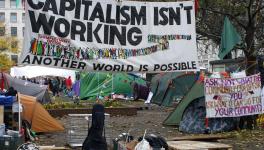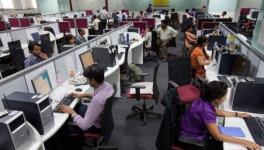Will China Replace U.S. as the Next Global Superpower?
The World Economic Forum annual meeting recently took place. The question that arises is if Davos will address the global financial crisis. Every year they come out with reports of increasing inequality in and across countries. While on one hand they showcase their concerns, in actual practice and deliberations in Davos, they reinforce the status quo and go towards more aggressive forms of globalization. There is a very clear message from Davos that the real way forward for global economy is to focus on growth. And their way of energizing growth is greater global integration amid trade agreements like TPP. Ironically, it is countries like China, India, Vietnam, Thailand, Malaysia that are for globalization. President Xi Jinping talked about globalization, against protectionism. While U.S. under Trump, is talking about going protectionist and isolationist. The Chinese are becoming more aggressive and seem to be replacing the Americans. In terms of financial capitalism, Davos admits that capitalism is in crisis and is instigating others to help them find ways out of the crisis. But interestingly, China has emerged as the one reiterating that capitalist development is the right way forward. With such detrimental drawbacks of financial globalization, will the elite economists address these concerns, or remain oblivious to the problems of the real world?
Rough Transcript:
Prabir Purkayastha (PP): Hello and welcome to Newsclick. Today we have with us Prof. Biswajit Dhar. We are going to discuss Shenanigans of discussions in Davos. The World Economic Forum is meeting. Do they actually address the central question which is coming today. The crisis of the so called question which is coming today, the crisis of the so called globalization which they have followed which is really that finance the globalization.
Biswaji Dhar: That is something that Davos has never addressed effectively although they make a lot of noise about how global capitalism is going to be changed. Every year they bring out a set of documents which talk about fact that globalization has created increasing inequality both across countries and within countries. But those seem to be just another way of grand standing show that they are responsible people and they are aware of the problems and they have the intentions of changing the system. But in actual practice what you find in the discussions in the deliberations in Davos year and on you will find reinforcement of status quo and going towards more aggressive forms of globalization. Of course, the characters change. Year after year,
PP: We are talking about kind of policies that Davos or the World Economic Forum all this is pursued you are saying that they are making some lip services while having more aggressive globalization policy. So what are the aggressive globalization policies that today we are finding Davos is doing?
BD : For instance, there is a very clear message coming from Davos and some of the major CEOs making this point that the real way forward for the global economy is just to focus on growth. Now same old story that you have heard time and time again and that the only way in which growth can be energized through greater global intergration and putting in place all these new forms of trade agreement that you are seeing for instance TPP and Asia Pacific Region and a closer home. You have this Regional Comprehensive Economic Partnership. So one is seen resurrection of these agreements at a time when for instance Donald trump has junked them and for all practical purposes TPP which was standing on the legs of the United States has no legs to go forward. So I think that has become a very big issue in Davos that these CEOs are coming together and some of the world leaders are coming in support of these leaders saying that need to reinforce the status quo going forward.
PP: It is interesting that China has actually now taken up the mantle that US had in terms of propagating globalization. Of course, it is also true that they are the largest manufacturing country in the world today and therefore, China propagating Globalization is really opening other people's market to their global goods, their goods. Do you see China will be able to shore up this world Economic Forum's platform of greater global integration?
BD: This is an interesting dimension that is taking place in Davos because as US under Trump is showing signs of retreat and talking about a more isolation kind of a taking that kind of a view. The Chinese have become more aggressive and they seem to be taking the place of the Americans and the the speech that President Xi gave the other day on globalizaiton, on the benefits of globalization and he made a very strong point that globalization does not result in the kind of problems that even World Economic Forum has been talking about in its reports is quite astounding.
PP: It is actually two ironies. One is globalization paradigm was selling opium to China and that's with three opium wars took place supposedly to open the Chinese economy. Then we have the current scenario where the Western powers aggressively pursuing globalization and now that it has come back to hit them, now they are talking about protecting themselves essentially from those who invaded earlier as it were economically.
BD: You are absolutely right. The circle seems to have come completely round from the late 70s. China was the one which got plunged into this whole globalization. Of course, China did it with its own violation. But other developing countries were pushed by the Americans aided and abetted by the World Bank and International Monetary Fund and we had this whole Washington consensus coming around. So went to the whole cycle and come the great financial criscis of 2008 when Obama , Bush and then Obama realised then they have gone to far. Now they need to now start developing their own manufacturing and get a little more an inward looking and the fact that they can't remain so open. Well, Trump as a good businessman is not talking diplomacy any more. He is now very clear that it's time for US to close doors and they can't tolerate trade any more and they have to go against open trade and become more inward looking and who does jump into this? The first guy who actually got into this process of globalization.
PP: It is interesting what you are saying because the Trump's argument is interesting is about manufacturing. But real estate, finance that has been the way and actually globalization is taking place and manufacturing has been hit also by the fact technological changes have taken place. You are going to see 3D printing, you are seeing automated factories, the old style of employment that existed in the factories today is no longer possible to have that. Give that, Trump seems to be playing identity politics rather than even protectionist.
BD: For Trump, it is also a fact that it is in the good old world of manufacturing that employment really lies. So on the one hand, there is a compulsion for Donald Trump and that was his vote bank in Michigan and other places when he went and sold this idea of creating more jobs. So he has this compulsion of creating jobs. So without this good old world, he can't actually get those jobs. The other thing which actually happened with China is that China is right there in the world of finance which you are talking about.
Over the past few years China has calibrated the entry of Yuan into this big bad world of finance. We saw short while back that the Chinese Yuan is now the part of SDRs. So in a way, it has been recognized as international currency. So in one way the Chinese are also playing the same old game of coming into the whole process of globalization using the same old tricks of finance and also technology. Let's not forget about the fact that if the patent numbers are any indicator of innovation. The Chinese are way ahead of the Americans. The total patent applications in China of the Chinese patent office crossed a million mark and the Americans are lagging behind and they are not even half a million. So the Chinese developments will have to be seen very carefully in a very light of the aggression that now they are showing.
PP: But, as far as Davos is concerned, are we seeing anything new in order to address one central issue which has being plaguing a lot of the countries which is the so called iniquitous tax regime by which some countries benefit for what it calls tax havens, which are really phenomenon of certain Western countries the US, Britain which is one of the really big tax havens in the world and to also to some extent Europe. Do you see that Davos coming out with anything that addresses these issues which are really close to the financial world which we are talking about?
BD: No, not really because you know for two reasons. First, in terms of you know the crisis of capitalism. There were admits and there have been several publications which admits that capitalism is in crisis. They are trying wanting to find ways they are actually instigating others to help them to find ways out of this crisis. But interestingly what has happened is that China has come in and reinforced the fact that the old model of capitalist developed is the right way to go forward. If you have second largest economy and moving towards the largest economy very soon. If that economy and the President comes and reinforces the benefits and the virtues of capitalism then there is very little that a capitalist world can do to undo the damage that itself perceive of the system. So that's point number one and linked to that is the fact that you ask the question that the real culprit behind this capitalism and the exploitative nature of capitalism is capital itself. The form of capital and the way you were rightly mentioning use this tax havens and going around. Now a few years back G20 tried to address this issue they called it Base Erosion Profit Shifting process of the global companies going around and doing this business in a way that deprives both the home countries and the host countries in a large number of ways. Now, in the past few years one didn't see any appetite going forward. Now again, interestingly the push towards doing something on that count is coming from the United States. Again Trump, he comes and took the centre stage saying that the American companies can not just put their money in other countries in different tax havens and deprive the American economy of investible surplus. So he is trying to again put pressure on these companies. Put some amount of discipline to bring back ill gotten wealth back into the US.
PP: Ill gotten wealth from all over the world.
BD: All over the world. It has never happened in the past if you look at the history the Euro Dollar world got created because of the American pressure of bring back the companies with these funds into the US this never happened. So let see what happens. If history is anything to rely on I don't think, the world of finance is going to be changing. It has changed for good in the bad way. I don't think it is going to ever change.
PP: Thank you Biswajeet. We will keep discussing these issues as you go further. This is all the time we have at Newslcik today. Keep watching Newsclick for further episodes.
Disclaimer: Please note that transcripts for Newsclick are typed from a recording of the program. Newsclick cannot guarantee their complete accuracy.
Get the latest reports & analysis with people's perspective on Protests, movements & deep analytical videos, discussions of the current affairs in your Telegram app. Subscribe to NewsClick's Telegram channel & get Real-Time updates on stories, as they get published on our website.
























